HVAC Companies Abertillery
Find top Heating and Cooling Services in Abertillery
Receive up to 3 Air Conditioning Services quotes for your project today! Compare profiles, reviews, accreditations, portfolio, etc... and choose the best service.
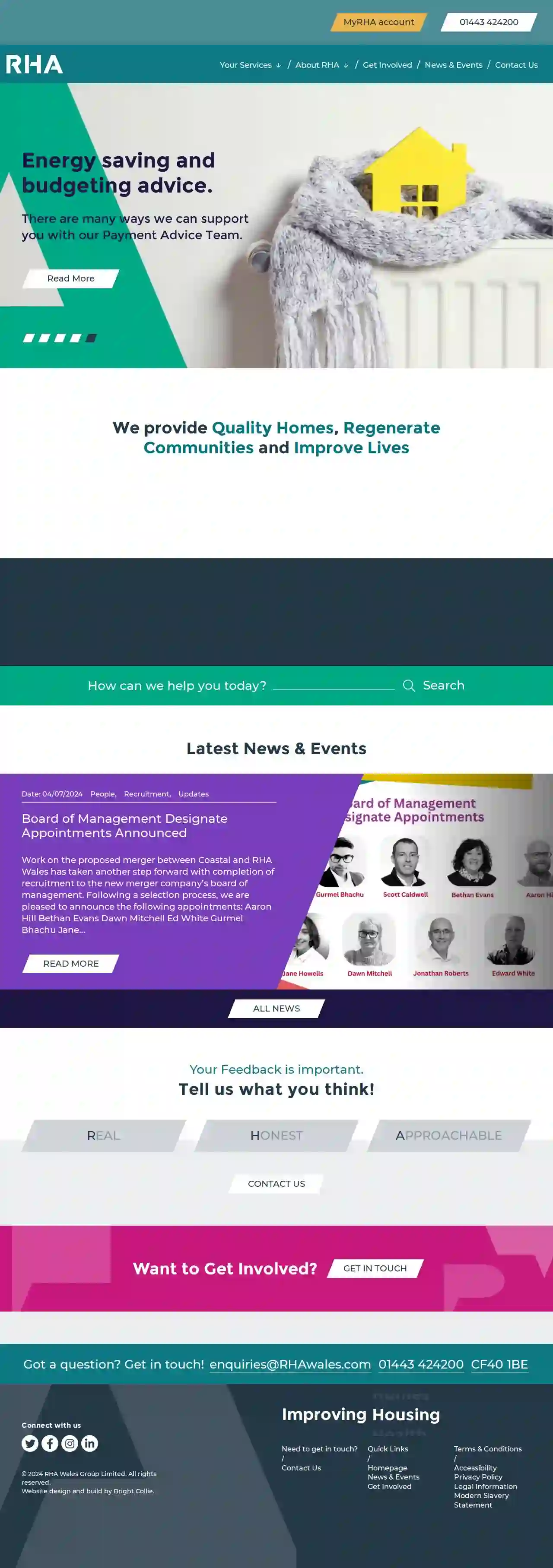
Rhondda Housing Association
3.547 reviewsHigh Street, Pontypridd, The Little Shed, 10-12, CF40 1BE, GBRHA Wales is a leading housing association dedicated to providing quality homes and improving lives across Wales. We are committed to regenerating communities and creating thriving spaces where people can live, work, and grow. Our mission is to deliver exceptional customer service, build strong relationships with our tenants, and make a positive impact on the lives of the people we serve. With a rich history of providing affordable housing, RHA Wales has a proven track record of success. We have a dedicated team of professionals who are passionate about making a difference. Our expertise spans a wide range of areas, including: Rent and Housing Management: We offer a range of affordable rent options and provide comprehensive housing management services to ensure our tenants have a safe and comfortable place to call home. Repairs and Improvements: We are committed to maintaining our properties to a high standard and providing prompt and efficient repairs. We also invest in planned improvements to enhance the quality of our homes and communities. Advice and Support: We offer a range of advice and support services to help our tenants with issues such as budgeting, energy saving, and home safety. Community Engagement: We believe in working closely with our communities to understand their needs and deliver services that make a real difference. We actively engage with local residents, businesses, and organizations to create thriving and inclusive communities. At RHA Wales, we are committed to: Providing quality homes that meet the needs of our tenants. Delivering exceptional customer service. Regenerating communities and creating thriving spaces. Improving the lives of the people we serve.
- Services
- Why Us?
- Accreditations
- Gallery
Get Quote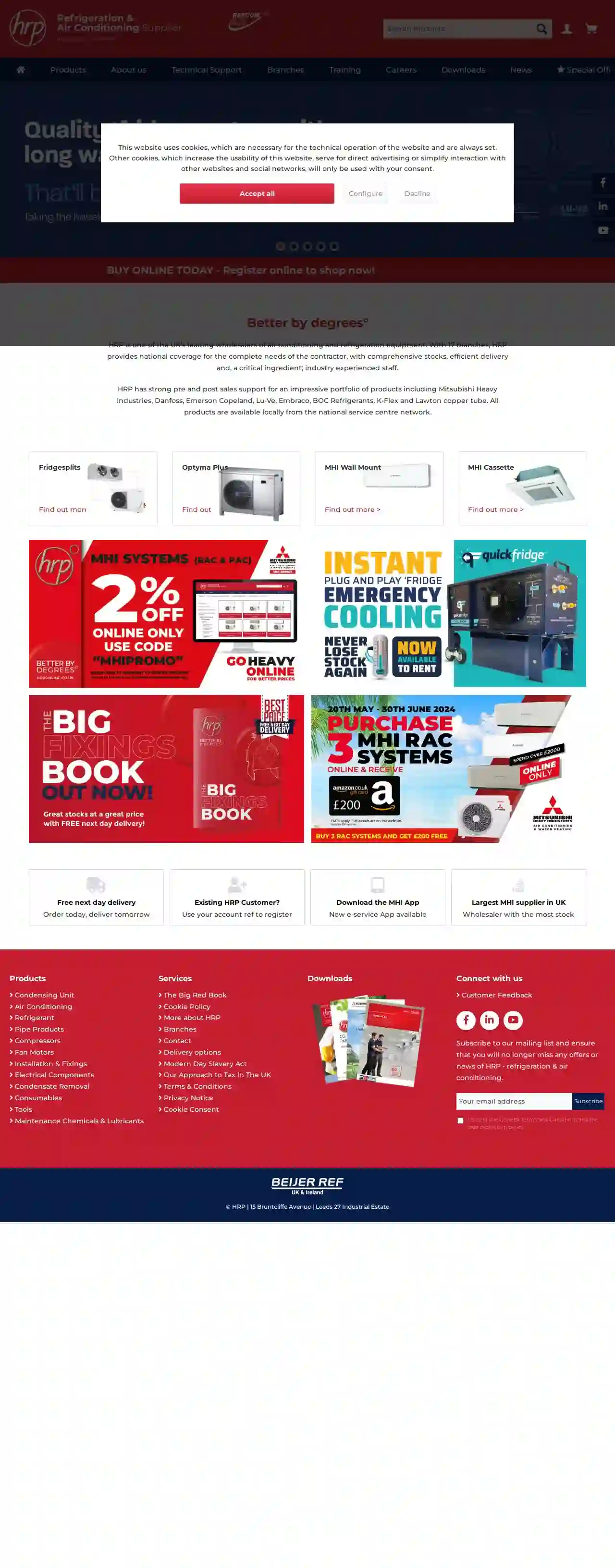
HRP
4.58 reviewsBristol, GBTrading since 1945, HRP is one of the longest established refrigeration and air conditioning wholesalers in the UK. Learn more about our company history and mission.
- Services
- Why Us?
- Gallery
Get Quote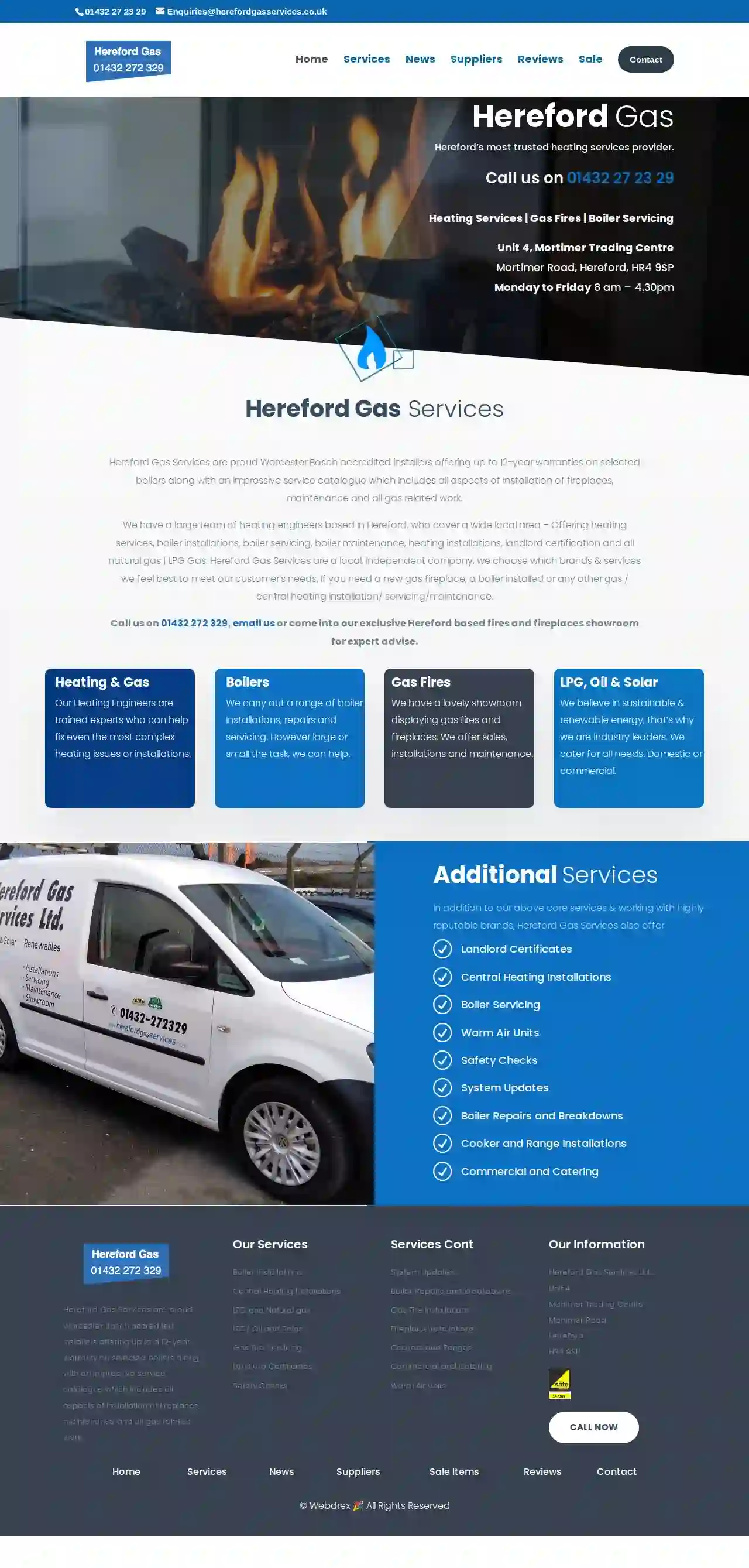
Hereford Gas Services Ltd | Heating Engineers Hereford
4.636 reviewsMortimer Road, Unit 4, Mortimer Trading Centre, Hereford, HR4 9SP, GBHereford Gas Services are proud Worcester Bosch accredited installers offering up to 12-year warranties on selected boilers along with an impressive service catalogue which includes all aspects of installation of fireplaces, maintenance and all gas related work. We have a large team of heating engineers based in Hereford, who cover a wide local area – Offering heating services, boiler installations, boiler servicing, boiler maintenance, heating installations, landlord certification and all natural gas | LPG Gas. Hereford Gas Services are a local, independent company, we choose which brands & services we feel best to meet our customer’s needs. If you need a new gas fireplace, a boiler installed or any other gas / central heating installation/ servicing/maintenance. Call us on 01432 272 329, email us or come into our exclusive Hereford based fires and fireplaces showroom for expert advise.
- Services
- Why Us?
- Accreditations
- Our Team
- Testimonials
- Gallery
Get Quote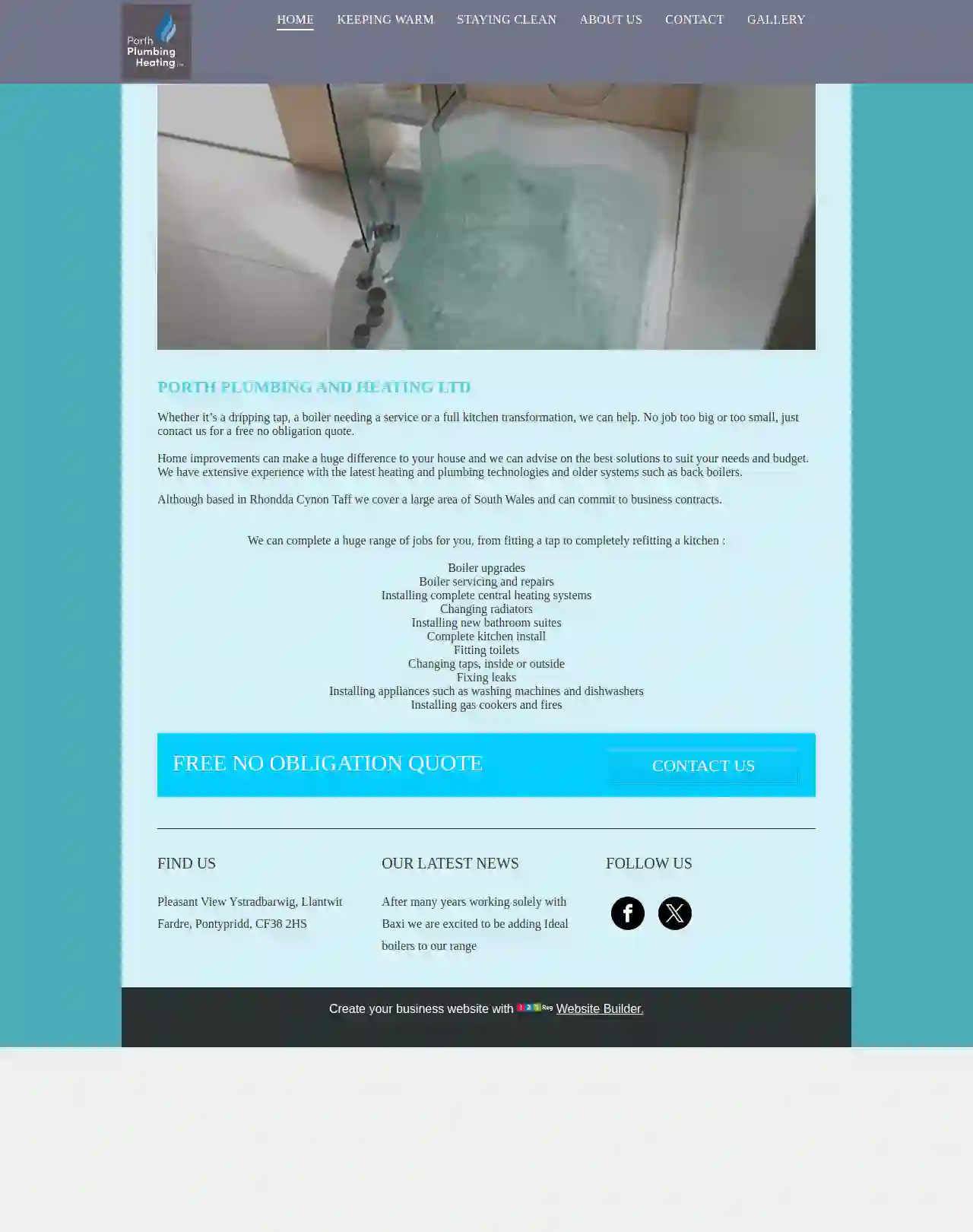
Porth Plumbing & Heating Ltd
515 reviewsYstradbarwig, Llantwit Fardre, Pleasant View, Pontypridd, CF38 2HS, GBPORTH PLUMBING AND HEATING LTD is a family business with over 30 years of experience serving the valleys and surrounding areas. We pride ourselves on customer satisfaction, with a lot of our work coming from recommendations. Whether it's a dripping tap, a boiler needing a service, or a full kitchen transformation, we can help. No job is too big or too small. We offer free, no-obligation quotes and can advise on the best solutions to suit your needs and budget. We have extensive experience with the latest heating and plumbing technologies, as well as older systems like back boilers. Although based in Rhondda Cynon Taff, we cover a large area of South Wales and can commit to business contracts. Our team can complete a wide range of jobs, from fitting a tap to completely refitting a kitchen. We offer services such as: Boiler upgrades Boiler servicing and repairs Installing complete central heating systems Changing radiators Installing new bathroom suites Complete kitchen installs Fitting toilets Changing taps, inside or outside Fixing leaks Installing appliances such as washing machines and dishwashers Installing gas cookers and fires
- Services
- Why Us?
- Accreditations
- Gallery
Get Quote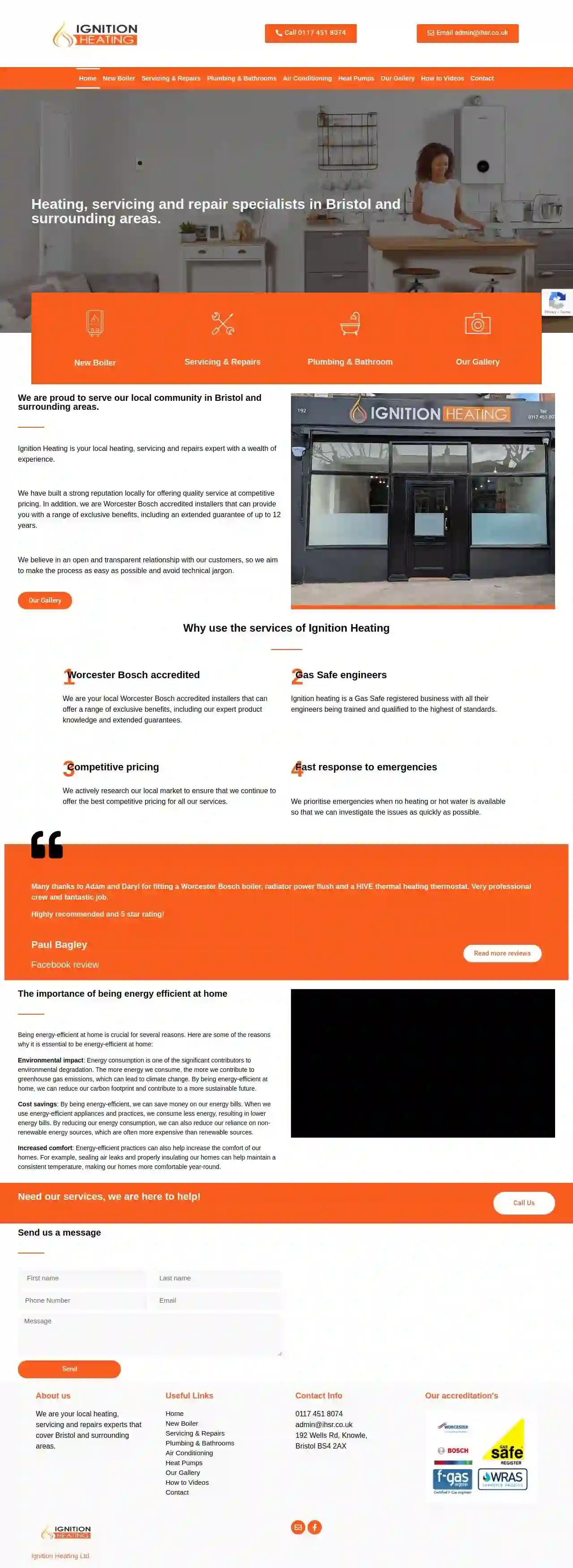
Ignition heating
54 reviews192 Wells Rd, Knowle, BS4 2AX, GBIgnition Heating is your local heating, servicing and repairs expert with a wealth of experience. We have built a strong reputation locally for offering quality service at competitive pricing. In addition, we are Worcester Bosch accredited installers that can provide you with a range of exclusive benefits, including an extended guarantee of up to 12 years. We believe in an open and transparent relationship with our customers, so we aim to make the process as easy as possible and avoid technical jargon.
- Services
- Why Us?
- Accreditations
- Our Team
- Testimonials
- Gallery
Get Quote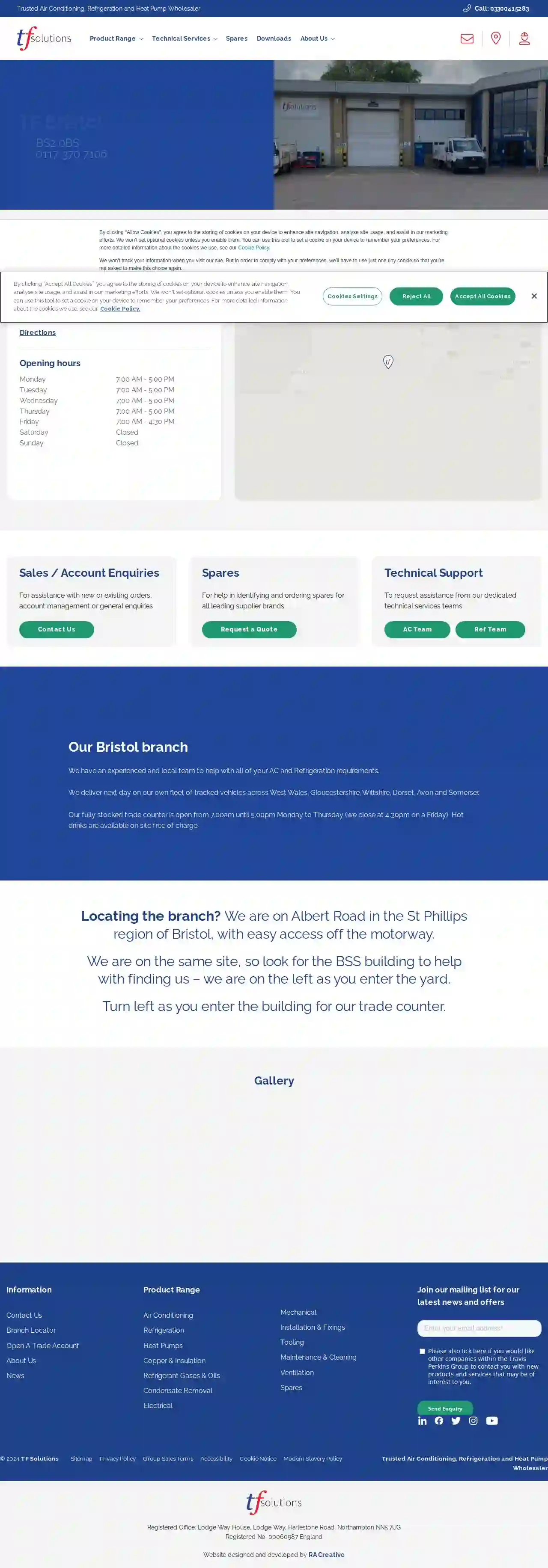
TF Solutions, Bristol
32 reviewsAlbert Rd, Bristol, BS2 0BS, GB- Services
- Why Us?
- Gallery
Get Quote
JCW Energy Services
32 reviewsBristol, GBJCW Energy Services is a national Mechanical and Electrical building service provider, offering integrated planned preventative as well as reactive maintenance services across all property portfolios. We provide complete project management, installation, in house maintenance and tailored managed solutions to a broad range of clients across the UK. Our 8 offices are strategically placed and take ownership of their areas customers to provide a fast, reliable, local service. Our engineers are fully qualified, have a wealth of experience, are accommodating and genuinely care about the work they conduct and the service they provide.
- Services
- Why Us?
- Testimonials
- Gallery
Get Quote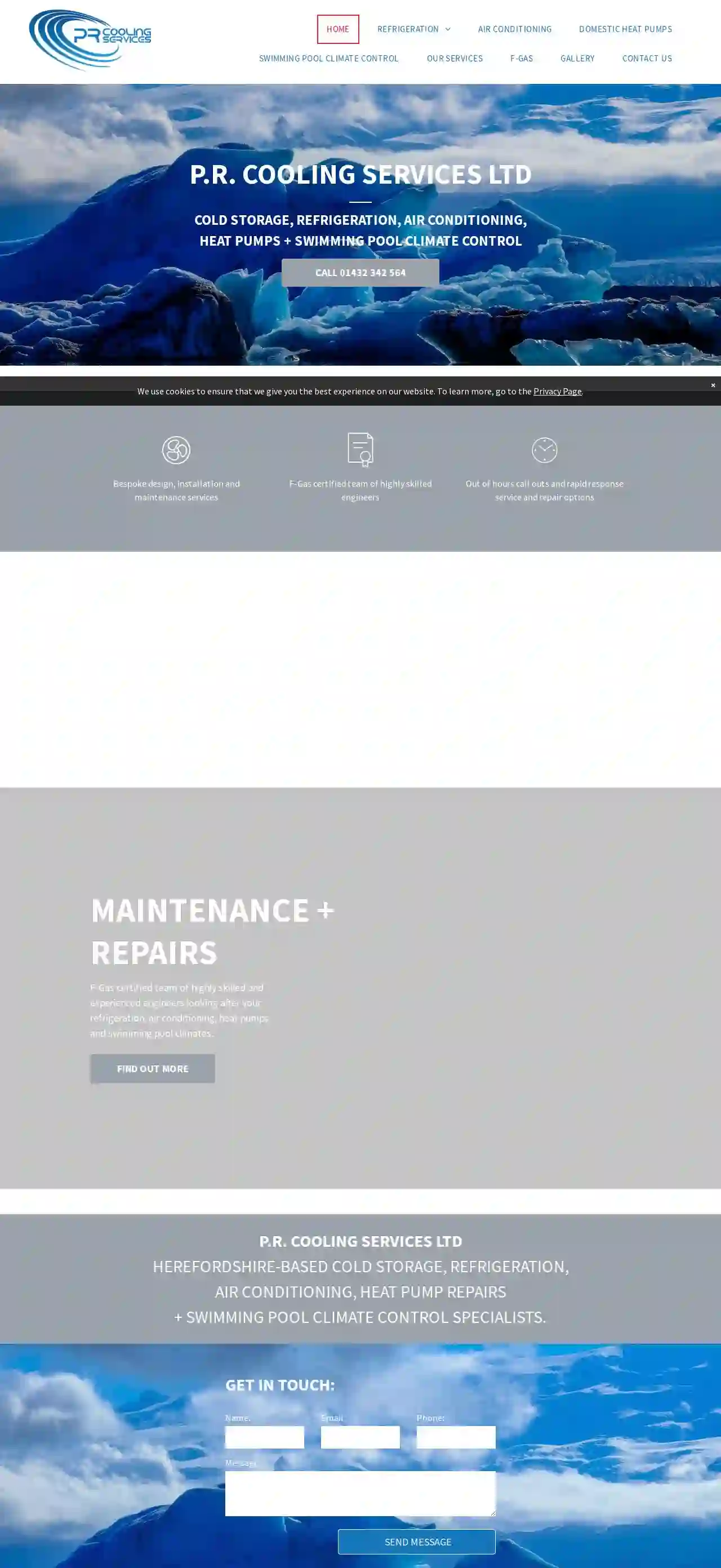
P R Cooling Services Ltd
57 reviewsUnit 1b, Sweetman’s Yard, Plough Lane, Hereford, HR4 0EE, GBP.R. Cooling Services Ltd is a Herefordshire-based company specializing in cold storage, refrigeration, air conditioning, heat pump repairs, and swimming pool climate control. We offer bespoke design, installation, and maintenance services for a range of clients, from agricultural and commercial to domestic and industrial. Our F-Gas certified team of highly skilled engineers provides out-of-hours call outs and rapid response service and repair options. We are committed to delivering exceptional service and ensuring your complete satisfaction.
- Services
- Why Us?
- Gallery
Get Quote
Multi-Heat Services Ltd.
4.834 reviewsUpper Church Village, Carisbrook, Pontypridd, CF38 1EE, GBWelcome to Multi-Heat Services Ltd, a company based in South Wales and covering all of the surrounding areas as well as UK-wide for some of our commercial clients. We pride ourselves on ensuring our customers receive an outstanding service. With over 13 years of experience and 7 experienced engineers, we have the knowledge and expertise to provide a wide range of heating, ventilation, and air conditioning services for domestic, commercial, and industrial clients. Our team of office and support staff help with the day-to-day administration and organisation of the business, ensuring that our customers receive a seamless service from start to finish.
- Services
- Why Us?
- Accreditations
- Our Team
- Testimonials
- Gallery
Get Quote
Watkins D V Ltd
58 reviewsThe Willows, Newtown Lane, Leominster, HR6 8QD, GBBased near Leominster, Herefordshire, we have been established since 1987. We have grown to become one of the most successful leading plumbing and heating engineering companies in the Herefordshire, Worcestershire and Shropshire area. We cover both domestic and commercial requirements with most of our work coming directly from personal recommendations, builders and architects. Our services include gas, oil, solid fuel, solar and ground pump installations as well as maintenance, servicing and repairs. Our staff are highly trained and qualified to carry out design, estimating and installation.
- Services
- Why Us?
- Gallery
Get Quote
Over 12,692+ HVAC Businesses registered
Our HVAC companies operate in Abertillery and beyond!
HVACCompaniesHub has curated and vetted Top HVAC Contractors in Abertillery. Find a top & trustworthy business today.
Frequently Asked Questions About HVAC Companies
- Regular Air Filter Replacement: Change or clean your HVAC system’s air filters regularly (every 1-3 months).
- Professional Air Duct Cleaning: Have your air ducts cleaned by professionals every few years to eliminate dust, mold, and other contaminants.
- Improve Ventilation: Ensure adequate ventilation in your home to bring in fresh air and exhaust stale air. Use exhaust fans in kitchens and bathrooms.
- Control Humidity Levels: Use a humidifier or dehumidifier to maintain optimal humidity levels and prevent mold growth.
- Clean Regularly: Dust and vacuum frequently to minimize airborne particles.
- Avoid Smoking Indoors: Smoking indoors significantly reduces IAQ.
- Use Natural Cleaning Products: Opt for natural cleaning products that don’t release harmful VOCs (volatile organic compounds).
- Monitor Indoor Air Quality: Consider using an indoor air quality monitor to track pollutant levels.
- Reduced Airflow: Noticeably weaker airflow from your vents.
- Dusty Vents: Dust accumulation around your vents.
- Increased Dust: More dust than usual in your home.
- Allergies or Respiratory Issues: Worsening allergy symptoms or respiratory problems.
- Higher Energy Bills: A dirty filter restricts airflow, forcing your furnace to work harder.
- Overheating: The system overheats due to restricted airflow.
How can I improve my home's indoor air quality?
What is an AFUE rating, and why is it important?
How can I tell if my furnace filter needs changing?
What are the benefits of a programmable thermostat?
How can I improve my home's indoor air quality?
- Regular Air Filter Replacement: Change or clean your HVAC system’s air filters regularly (every 1-3 months).
- Professional Air Duct Cleaning: Have your air ducts cleaned by professionals every few years to eliminate dust, mold, and other contaminants.
- Improve Ventilation: Ensure adequate ventilation in your home to bring in fresh air and exhaust stale air. Use exhaust fans in kitchens and bathrooms.
- Control Humidity Levels: Use a humidifier or dehumidifier to maintain optimal humidity levels and prevent mold growth.
- Clean Regularly: Dust and vacuum frequently to minimize airborne particles.
- Avoid Smoking Indoors: Smoking indoors significantly reduces IAQ.
- Use Natural Cleaning Products: Opt for natural cleaning products that don’t release harmful VOCs (volatile organic compounds).
- Monitor Indoor Air Quality: Consider using an indoor air quality monitor to track pollutant levels.
What is an AFUE rating, and why is it important?
How can I tell if my furnace filter needs changing?
- Reduced Airflow: Noticeably weaker airflow from your vents.
- Dusty Vents: Dust accumulation around your vents.
- Increased Dust: More dust than usual in your home.
- Allergies or Respiratory Issues: Worsening allergy symptoms or respiratory problems.
- Higher Energy Bills: Your furnace becomes less efficient.
- Overheating: The system overheats due to restricted airflow.